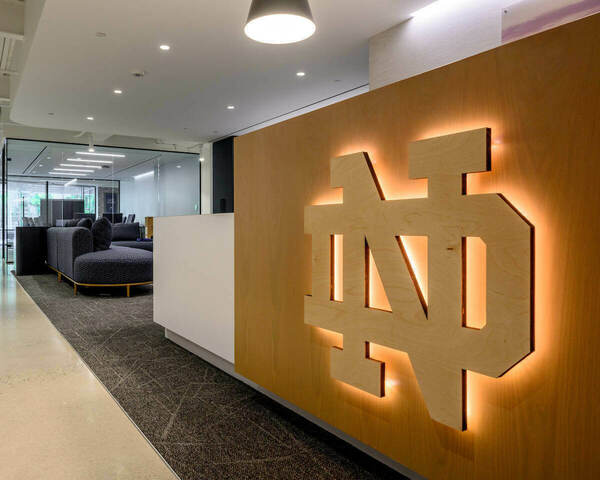ND Learning Expands AI Offerings with Faculty Academy, New Lab

The widespread availability of artificial intelligence tools means faculty need dedicated support to help them explore the ways AI is impacting teaching in their disciplines and how, if at all, to integrate it in their own courses.
With the Notre Dame Teaching Well with AI Academy (NDTWAA) and the Lab for AI in Teaching and Learning (LAITL), Notre Dame Learning has launched two initiatives in recent months designed to work with instructors in just this manner.
During the spring semester, more than two dozen faculty from across the University’s colleges and schools participated in the first-ever NDTWAA. The academy was developed and led by Alex Ambrose, professor of the practice at Notre Dame Learning’s Kaneb Center for Teaching Excellence and director of LAITL; Steve Varela, director of OIT’s Teaching & Learning Technologies; Kevin Abbott, academic tech specialist in Teaching & Learning Technologies; and Ardea Russo, director of the Office of Academic Standards.
“Instructors should make their own decisions about whether to use AI in the classroom or incorporate it into their assignments, but I think we’ve reached a point where everyone can benefit from basic AI literacy, at least as it pertains to higher education,” Russo said. “But everyone is also so busy that unless we deliberately make time to explore these tools, it is unlikely to happen. We wanted to create a dedicated space to focus on AI, how it can be helpful in academia, and what its limits and risks are to bring more people into the conversation.”
NDTWAA met monthly from January through May, with the first session introducing the foundations of AI in teaching and learning. The academy’s organizers and invited guest speakers subsequently led faculty through strategies for leveraging AI for course design and syllabus development; setting clear expectations around students’ use of generative AI in their assignments; and crafting slides, generating discussion and poll questions, and designing interactive learning activities with AI assistance.
“This is must-know information in this new era, even if its broader implications for pedagogy still need to be worked out. I’m very grateful to ND Learning for the care that went into this, and for charting the narrow path between AI proselytizing and AI doomsaying.”
—David Gibson, associate professor of sociology
Throughout, participants earned digital badges for completing challenges that they can display on their social media profiles and Canvas sites to document the skills they attained or refined.
The final meeting on May 2 was an opportunity for participants to reflect on the relevance of various AI-use frameworks to their specific disciplines, how their fields might need to evolve in response to the ever-expanding capabilities of technology, and their thoughts on what AI means for both society generally and educators specifically.
“We’re at both ends of the spectrum,” Varela observed during that concluding session, “from excitement over the opportunities this opens up to concerns over disruptions, particularly in higher education.”
Kevin Guidry, assessment program director in the Kaneb Center, also talked with the group about how the work individuals did through the academy might start to translate to department- and program-level support for adapting curricula in light of AI.
“The academy was carefully conceived and executed, imparting a wealth of information about what AI can do for instructors and, for better or for worse, for students,” said David Gibson, an associate professor of sociology who participated in NDTWAA. “This is must-know information in this new era, even if its broader implications for pedagogy still need to be worked out. I'm very grateful to ND Learning for the care that went into this, and for charting the narrow path between AI proselytizing and AI doomsaying.”
Elena Mangione-Lora, a teaching professor of Spanish, noted that while AI is great for improving how systems work, it can’t replicate the human connection that is built between teacher and students, which in turn facilitates a fuller learning experience. In the case of disciplines like hers, that means opening students up to the culture, art, and music of the language they’re studying.
“I’m going to speak passionately to students about the fact that if you have nothing to say and have no one to say it to, speaking/knowing another language is meaningless,” she said.
Notre Dame Learning plans to continue offering the academy on a regular basis. While the first cohort of participants began meeting a couple of months before the official founding of the Lab for AI in Teaching and Learning, NDTWAA will be among the new lab’s core components moving forward and central to realizing its goals.

Under the direction of the Kaneb Center’s Ambrose, LAITL will convene faculty, staff, postdoctoral fellows, and undergraduate research assistants interested in advancing AI literacy in education, exploring AI-driven teaching and learning innovation, and fostering AI collaboration across campus and institutions.
The lab builds on an extensive foundation of workshops and on-demand resources related to AI that Notre Dame Learning has developed over the last two academic years.
“The AI genie is out of the bottle—and it’s not going back,” Ambrose said. “When ChatGPT launched, there was no instruction manual. I was inspired by the faculty who participated in this first NDTWAA and their willingness to consider what AI literacy means for themselves, their students, and the future. In my 10 years at the Kaneb Center, I’ve never seen such deep, cross-disciplinary engagement.
“We’re witnessing a pivotal shift in how many of us teach, assess, and learn, and that’s exactly why LAITL was created. The lab will accompany Notre Dame faculty as they explore the degree to which AI impacts teaching in the various disciplines and help them make informed decisions about if, when, and how to incorporate it into their classrooms.”
NDTWAA Spring 2025 Cohort (click to expand)
Susan Azyndar
Senior Associate Director, Kresge Law Library
Christopher Ball
Associate Professor, Department of Anthropology
Martin Barron
Associate Teaching Professor, Department of IT, Analytics, and Operations
Tatiana Botero
Teaching Professor of Spanish, Department of Romance Languages and Literatures
Patrick Clauss
Francis O’Malley Director, University Writing Program
Janet Effron
Director of Online Learning, McGrath Institute for Church Life
Germán Estrada Mendoza
Academic Director, ESTEEM Graduate Program
Michelle Flahive
Assistant Teaching Professor, University Writing Program
David Gibson
Associate Professor, Department of Sociology
Mark Golitko
Assistant Professor, Department of Anthropology
David (Neal) Gwaltney
Adjunct Assistant Teaching Professor, Department of Art, Art History, and Design
Randy Harrison
Emerging Technologies Librarian, Hesburgh Libraries
Berthold Hoeckner
Keough-Hesburgh Professor of Music History and Department Chair, Department of Music
Maria Holland
Assistant Professor, Department of Aerospace and Mechanical Engineering
Hope Hollocher
Associate Professor, Department of Biological Sciences
Victoria Tin-bor Hui
Associate Professor, Department of Political Science
Tara Kenjockety
Undergraduate Community Engagement Librarian, Hesburgh Libraries
Randy Kozel
Fritz Duda Family Professor of Law and Associate Dean for Faculty Development and Academic Affairs, The Law School
Dana Lashley
Associate Teaching Professor, Department of Chemistry & Biochemistry
Elena Mangione-Lora
Teaching Professor of Spanish, Department of Romance Languages and Literatures
Terence McDonnell
Henkels Family College Professor and Department Chair, Department of Sociology
Monica Moore
Department Head, Research Services and Scholarly Communications, Hesburgh Libraries
Sandria Morten DeSapio
Assistant Teaching Professor, Alliance for Catholic Education
Nathaniel Myers
Associate Teaching Professor, University Writing Program
Timothy O’Malley
Professor of the Practice, Notre Dame Center for Liturgy
Susan Ostermann
Assistant Professor of Global Affairs, Keough School of Global Affairs
About Notre Dame Learning
Notre Dame Learning houses the Kaneb Center for Teaching Excellence and the Office of Digital Learning, bringing together their teaching and learning expertise along with that of the OIT’s Teaching & Learning Technologies group to serve as the hub of learning excellence and innovation at Notre Dame. Working in collaboration with instructors, departments, and colleges, Notre Dame Learning aims to enable effective and engaging learning for all students through research-based strategies and effective use of technologies across all modalities.
Originally published by at learning.nd.edu on May 29, 2025.
Latest Research
- When Byzantium Met Islam: Marie Skłodowska-Curie Fellow Explores Remarkable Religious Exchanges in the Medieval Eastern Mediterranean WorldSince fall 2023, the Medieval Institute has been honored to host Dr. Manolis Ulbricht, who holds a Marie Skłodowska-Curie Global Postdoctoral Fellowship. This prestigious multi-year fellowship supports…
- Notre Dame announces next step for emerging tech and talent district in downtown South BendThe Tech and Talent District, a keystone of the city of South Bend’s Downtown South Bend 2045 plan, has advanced a step closer to implementation via a partnership between the University of Notre Dame and Ancora to pursue the development of the first phase of the district.
- Notre Dame Washington Office and Notre Dame International Security Center host national security discussion for young professionals in DCLast month, the University of Notre Dame’s Washington Office and the Notre Dame International Security Center (NDISC) co-hosted “National Security & Intelligence: Thriving in Times of Transition,” a professional…
- A better start for NICU families: Notre Dame leads the way in neonatal intensive careIn this episode, Kathleen Kolberg, Ph.D., Associate Dean, College of Science, Office of the Dean, Assistant Director of the Center for Health Sciences Advising, shares how Notre Dame helped set the standard for NICU design and care. We also hear from Ainee Martin, a recently graduated chemical…
- Notre Dame opens new Washington Office to expand service and impact in nation’s capitalThe University of Notre Dame marked the opening of its new Washington, D.C., office with a blessing and dedication ceremony, highlighting the University’s growing presence in the nation’s capital.
- Olaf Wiest Selected for Notre Dame Research Achievement AwardOlaf Wiest Olaf…












